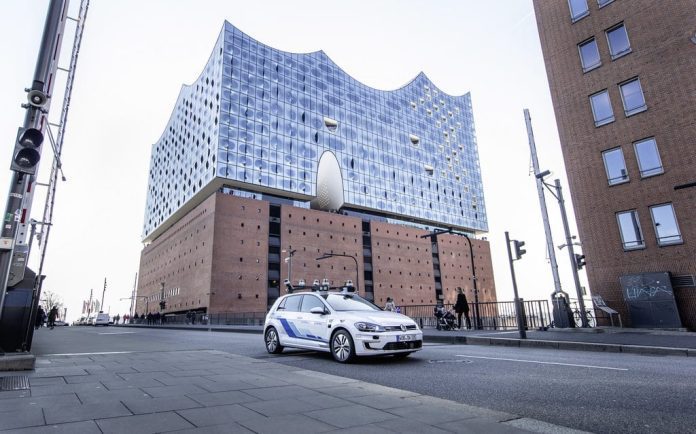German carmaker Volkswagen said it is currently testing Level 4 automated vehicles in urban traffic in the city of Hamburg.
The company said that a fleet of five e-Golf vehicles, equipped with laser scanners, cameras, ultrasonic sensors and radars, will drive on a three-kilometer section of the digital test bed for automated and connected driving in the German city. Level 4 autonomous vehicles are meant to be completely self-driving within their specific operational scenarios.
The results of the test drives will be incorporated in the Volkswagen’s numerous research projects on automated driving, and will test customer-centric services and optimize individual transport, the company said.
“The tests center on technical possibilities as well as urban infrastructure requirements. In order to make driving even safer and more comfortable in future, vehicles not only have to become autonomous and more intelligent – cities must also provide a digital ecosystem that enables vehicles to communicate with traffic lights and traffic management systems as well as with one another,” said Axel Heinrich, head of Volkswagen Group Research.
A nine-kilometer digital test bed for automated and connected driving is currently being constructed in the city of Hamburg, with completion scheduled for 2020. To that end, the city is upgrading traffic lights with components for infrastructure-to-vehicle (I2V) and vehicle-to-infrastructure (V2I) communication. Volkswagen and the city of Hamburg are thus taking a decisive step to further optimizing traffic flows through digitalization and to full-size implementation of automated driving in the city area.
Michael Westhagemann, Hamburg’s Senator for Economics, Transport and Innovation, said: “Two and a half years from now, Hamburg will be hosting the World Congress for Intelligent Transport Systems (ITS). Automated driving will play a key role. I am delighted that our strategic partner Volkswagen has already become the first user for our digital test bed. We will establish Hamburg as a model city for intelligent mobility and be presenting numerous innovative mobility projects to a global audience in 2021.”
The e-Golf configured by Volkswagen Group Research features 11 laser scanners, seven radars and 14 cameras.
In related news, Volkswagen said that it is already paving the way to build its own 5G networks in German factories to connect machines and boost productivity.
The carmaker highlighted that it is already having talks with equipment providers in order to deploy the first 5G networks at the firm’s sites at the end of next year. Volkswagen said it had already applied for a 5G license.
German communications regulator Bundesnetzagentur had previously said that it plans to offer regional licenses for spectrum in the 3.8 GHz and 26 GHz range. Several German car makers and industrial companies have already announced plans to take part in the process.
Volkswagen said that its car unit Audi is already working with equipment supplier Ericsson to test a 5G laboratory, according to German press reports. Daimler said that in partnership with a network provider, it will deploy 5G with the main aim of implementing smart production methods.
German chemicals giant BASF also said it will apply for a local 5G license as part of its drive to digitalize production, while Robert Bosch, the privately-held automotive supplier, said it will apply for local licenses to power its production facilities across the country. Siemens is also interested in acquiring regional 5G licenses for its Siemensstadt production facility in Berlin and its plant in Erlangen.

